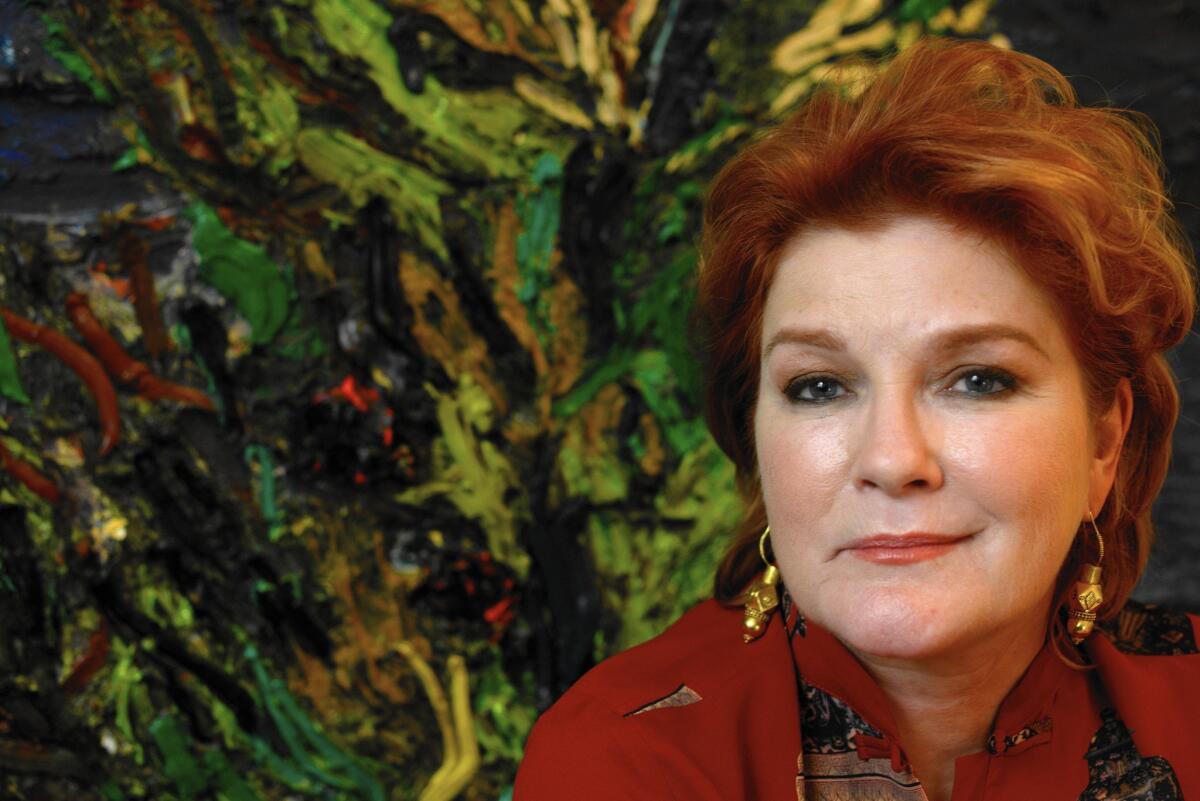Kate Mulgrew of ‘OITNB’ shows her softer side in ‘Born With Teeth’

- Share via
For four decades, iconoclastic actor Kate Mulgrew has captivated audiences with her portrayals of powerful and complex female characters, including “Star Trek: Voyager’s” Captain Janeway and Red in “Orange Is the New Black.” In her intriguing new memoir, “Born With Teeth,” she tells all about her sturm und drang-filled journey from America’s heartland to the farthest reaches of outer space.
Family is a strong theme in the book, from your eccentric beginnings to the nontraditional family you went on to create for yourself. Can you can talk a little bit about the changing face of family in our culture?
The first thing that comes to mind is that of course the size of the family has been much reduced. Therefore, as parents, we view the job with a different kind of intensity and discipline than my parents did. Now, parents hover over their children. Back in that day, there was a different sensibility, and it made us more spartan human beings, I think, and certainly more independent. I know that because I spoiled my own children rotten. I felt no end of the guilt and conflict of having to go to work. I shouldn’t have felt that. I shouldn’t have.
You write about trying to forge an alliance between art and family and “constantly failing.” Do you think the situation is changing for women in Hollywood right now?
I think things are changing. I’m working for a genius by the name of Jenji Kohan, and she’s created 50 parts for women. Cindy Holland is running Netflix. These are unconventional, unorthodox, exceedingly bright and ferociously independent women. I think the day is coming where we will be wanted; not just accepted but wanted as the stripped-down, compelling women that we are. Without our plastic surgery, without our bulimia, without our makeup and without 8 million men wanting to go to bed with us, we will be charismatic in and of ourselves. That is coming now, but it has taken quite a while. Hollywood still does love its beauties, you know. It’s unachievable beauty.
There’s a kind of liberty when you let go of your vanity and pay attention to your character. I want whatever I do for the rest of my life to be excellent or not to be done at all. By excellent, I mean it has to be really honest.
Your acting teacher Stella Adler taught you to channel your pain and disappointment into the work.
She’d say, “Pain is absolutely essential, integral to being a good actor. No great playwright, no great actor, no great director has ever done anything of value without pain. Use it.” She’s right. Read the life of Tennessee Williams. Read the life of Chekhov. Read the life of Tolstoy.
Does that also work the other way around? The pain transforms the work. Does the work also transform the pain in some way?
A great and seismic shift seems to be happening as a result of my having written this book. That is because for 41 years, I’ve spent my life playing other people, and finally — and it was scary, and it’s a very big moment — I realized I wanted to reveal myself and I wanted to be understood, and so I wrote it.
You know what it is? It’s self-examination. Once you’ve gone deep into yourself, you can go deep into anyone. Then you can go deep into the mysteries of life and then you’re free. That’s what’s going on.
How do you think “Star Trek” fans are going to feel about the captain showing these vulnerabilities?
They may be a little disappointed that I don’t write more about “Star Trek,” but I tried to write enough about it to gratify even the most ardent “Star Trek” fan. My plight, my path was a very crooked one, but it was also jubilant. I think that’s what marks us deeply as human beings. I’d like to be known as a human being, certainly, before I’d like to be known as a “Star Trek” actor.
One of the difficult truths you reveal in your book is that you placed a baby for adoption when you were a young woman, which haunted you for many years. There’s a new law in Ohio now that opens up previously sealed adoptions files, and similar things have been happening in a lot of states. How do you feel about that?
I think it’s absolutely right. The choice must always be there for all parties concerned. The door must be open to the truth that lies within the history of a family, not only for the child who is given up but for the birth mother and for the adoptive parents. Everyone deserves a shot at recognizing and confronting the reality. Most particularly, I would suggest, the child. I’m delighted to learn this. It shows a great justice of humanity, doesn’t it?
Mulgrew will appear at Festival of Books on April 18.
More to Read
Sign up for our Book Club newsletter
Get the latest news, events and more from the Los Angeles Times Book Club, and help us get L.A. reading and talking.
You may occasionally receive promotional content from the Los Angeles Times.










